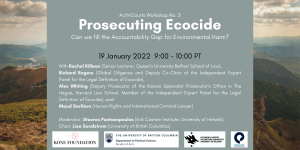
On Wednesday, January 19th, 2022, we led our fifth installment of our Practitioner-Scholar Roundtable. Since the inception of the idea to define and criminalize environmental harm in the 1970s, today there is a renewed momentum and support to address accountability for environmental harm. In June 2021, an Independent Expert Panel for the Legal Definition of Ecocide (‘Panel’), convened by the Stop Ecocide Foundation, proposed a new definition of ecocide as an international crime. Having received both positive and critical responses, this renewed effort might initiate a process to amend the Rome Statute of the International Criminal Court (ICC) with Ecocide becoming the Fifth International Crime.
The virtual panel discussed the challenges of defining and prosecuting ecocide, how to fight against impunity of environmental crimes in practice, and the limitations of the proposed definition. The discussion was led by:
- Rachel Killean is a Senior Lecturer in the Queen’s University Belfast School of Law and a Fellow of the Senator George J. Mitchell Institute for Peace, Security, and Social Justice.
- Richard Rogers is a Partner at Global Diligence and a Deputy Co-Chair of the Independent Expert Panel for the Legal Definition of Ecocide
- Alex Whiting is a Deputy Prosecutor of the Kosovo Specialist Prosecutor’s Office in The Hague and a Visiting Professor of Practice at Harvard Law School. Alex was a member of the Expert Panel that proposed a definition of the crime of Ecocide
- Maud Sarliève is a Human Rights and International Criminal Lawyer advocating for creative legal thinking to mitigate climate change and protect the environment
- Stavros Pantazopoulos (Moderator) is a post-doctoral researcher with the Toxic Crimes Project of the Erik Castrén Institute at the University of Helsinki and a Co-Chair of the Law Interest Group of the Environmental Peacebuilding Association
- Lisa Sundstrom (Chair) is a Professor of Political Science at the University of British Columbia
If you missed the event, you can watch a recording here.
